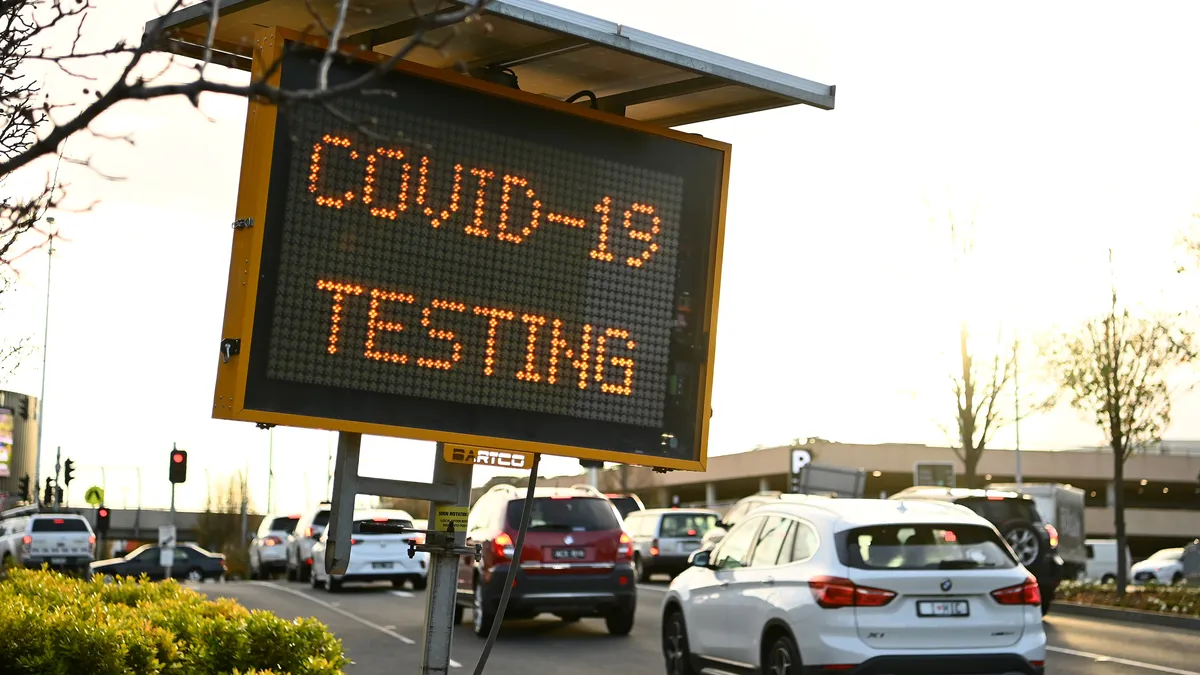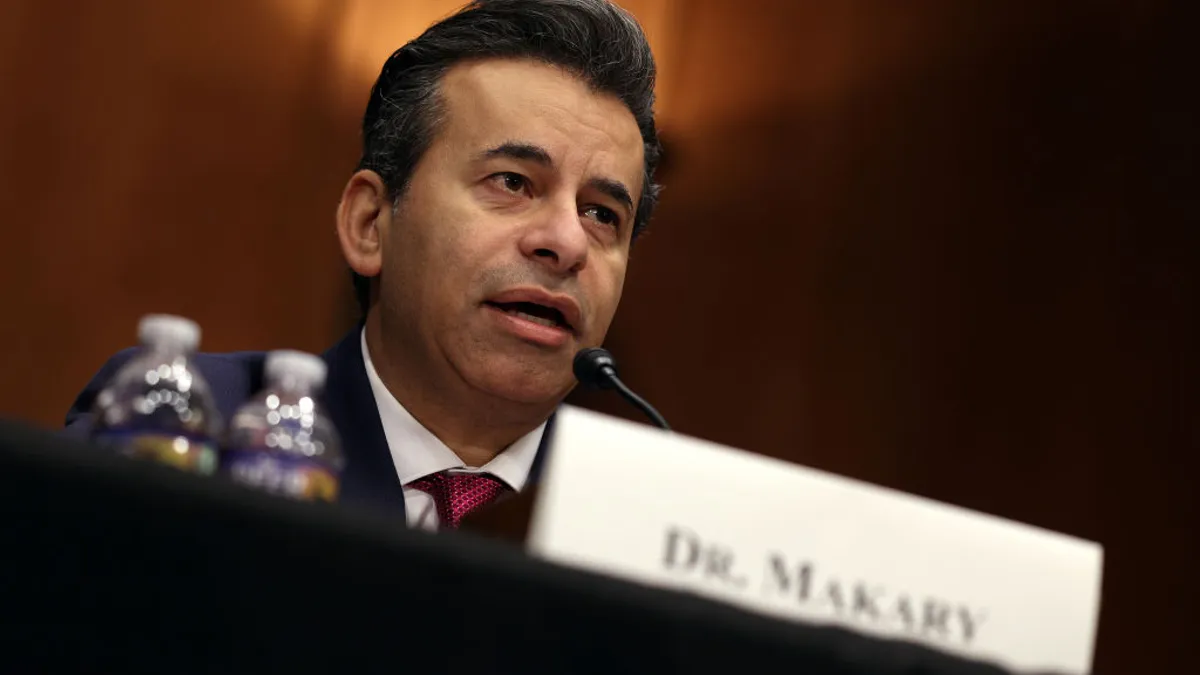The U.S. faces weeks of COVID-19 test shortages as the fast-growing omicron wave continues to outpace capacity, despite President Biden's plans for free at-home kits and the recent FDA authorization of over-the-counter tests made by Roche and Siemens Healthineers.
Last month, the Biden Administration outlined plans to distribute 500 million free home COVID-19 tests to help curb the spread of the highly transmissible omicron variant. Since then, U.S. coronavirus cases have skyrocketed, with the seven-day rolling average climbing from around 150,000 on Dec. 21, the day of Biden's announcement, to more than 480,000 on Jan. 3.
With cases rising and people seeking to safely interact with friends and family over the holidays, demand for rapid antigen tests soared.
"Need is going through the roof," Gordon Thompson, CEO of COVID-19 test distributor Westnet, told The Wall Street Journal. "What happened with masks, gloves and hand sanitizer back in March to December of 2020 is now happening to rapid test kits."
CVS and Walgreens have limited the number of tests customers can buy to six and four, respectively. Unable to source at-home kits, people in Florida queued for up to four hours to get tested and the health department in a part of Indiana told people not to visit emergency rooms for tests.
The U.S. situation is echoed in the U.K., where an omicron-driven surge in COVID-19 cases has resulted in shortages of both lateral flow and PCR tests, as well as five-day waits for results from lab-based tests.
The question now is when U.S. supply will meet demand. Two Republican senators on Monday demanded answers from the Biden administration.
Sen. Richard Burr (R-N.C.), ranking member of the Senate Health, Education, Labor and Pensions Committee, and Sen. Roy Blunt (R-Mo.) sent a letter to HHS Secretary Xavier Becerra asking what the administration's strategy is for solving the U.S. shortage of COVID-19 tests.
"With over $82.6 billion specifically appropriated for testing, and flexibility within the Department to allocate additional funds from COVID-19 supplemental bills or annual appropriations if necessary, it is unclear to us why we are facing such dire circumstances now. It does not appear to be because of lack of funding, but a more fundamental lack of strategy and a failure to anticipate future testing needs by the administration," the senators wrote.
Late last month, Roche and Siemens independently received emergency use authorization for their rapid antigen self-tests. FDA authorized both tests for at-home testing of people aged 14 years and up, as well as the testing of children aged 2 to 13 years when samples are collected by an adult.
Both kits performed well in the studies used to support their FDA EUAs, with Roche and Siemens respectively reporting sensitivities of 95.3% and 86.5% relative to PCR. Both kits have specificities of close to 100%.
HHS contends the companies can produce tens of millions of tests per month for use in the U.S. Roche and Siemens are already well-established in rapid antigen testing markets in Europe. Demand for COVID-19 rapid antigen tests caused Siemens' diagnostic revenues to double in its third quarter. Around the same time, Roche reported a 349% jump in sales of point-of-care tests.
With Roche and Siemens joining other diagnostic companies such as Abbott Laboratories and Quidel in the market, the U.S. is positioned to add to the supply of around 200 million at-home rapid antigen tests that were available last month.
Mara Aspinall, who tracks the testing market in her role as a health professor at Arizona State University, told NBC News she is "much more confident" that the U.S. can increase supply to 500 million tests a month than she was before the EUAs but is unsure how quickly capacity will rise. However, NBC reported it may take months to scale up production, while the WSJ said testing relief is likely still weeks away.
Roche and Siemens secured the EUAs through their participation in the NIH Rapid Acceleration of Diagnostics' (RADx) Independent Test Assessment Program. NIH set up the program to accelerate the regulatory review and availability of accurate and reliable over-the-counter tests.
As part of the initiative, NIH is collaborating with FDA to assess the accuracy of rapid antigen tests with omicron samples. Using patient samples containing live virus, RADx researchers found antigen tests "do detect the omicron variant but may have reduced sensitivity." If sensitivity falls from the around 90% level achieved against earlier variants, omicron could cause more false negatives and thereby contribute to increased transmission as people erroneously think they are not infected.
However, NIH has downplayed the concerns about the reduced sensitivity of antigen tests.
Bruce Tromberg, who leads the RADx program, told CBS News "a change in sensitivity in the laboratory is not a guarantee that there's a change in sensitivity from a clinical point of view." Tromberg is encouraging people to continue using rapid antigen tests and FDA is continuing to authorize new kits. A clearer picture of the accuracy of the tests against omicron could emerge as FDA continues to collaborate with RADx to evaluate performance.
Future updates may reveal that some tests are less affected by omicron than others. Quidel said RADx found its QuickVue antigen tests "are able to detect the live omicron variant with similar performance as with other variants." Roche said omicron had "no impact" on the performance of its rapid antigen test.
The biggest impact to date has been seen in the molecular diagnostics market. Last month, FDA said three tests, from Applied DNA Sciences, Meridian Bioscience and Tide Laboratories, are unable to detect omicron. Tide responded quickly and by the end of the month had created a multiplex test capable of detecting the new variant. FDA reissued Tide's EUA on Dec. 22.



















